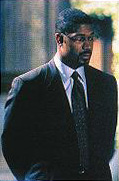 Insurance executive Michael
Wiseman (John Goodman) is dejected after being passed over for
promotion. But falling in front of a subway train brings on a
change much more significant when he wakes up in a young,
enhanced body (Eric Close).
Insurance executive Michael
Wiseman (John Goodman) is dejected after being passed over for
promotion. But falling in front of a subway train brings on a
change much more significant when he wakes up in a young,
enhanced body (Eric Close).Xpose
by James E. Brooks
Now and Again -- Season One
1: Origins
Written and Directed by Glenn Gordon Caron
Syndicated September 24, 1999
 Insurance executive Michael
Wiseman (John Goodman) is dejected after being passed over for
promotion. But falling in front of a subway train brings on a
change much more significant when he wakes up in a young,
enhanced body (Eric Close).
Insurance executive Michael
Wiseman (John Goodman) is dejected after being passed over for
promotion. But falling in front of a subway train brings on a
change much more significant when he wakes up in a young,
enhanced body (Eric Close).
Moonlighting creator Glenn Gordon Caron returns to television with a view of life decidedly different than that of his landmark comedy. Although this slickly-produced pilot is interwoven with sharp humor and ironic observation, its core deals with alienation. In a society where the influence and worship of youth has reached obscene heights, Caron uses the pilot as a vehicle to show the wreckage left in the wake of such veneration.
Caron's writing and direction make a welcome homecoming to primetime and will definitely brighten up a lackluster Friday this season. On the acting front, Goodman displays his considerable talents in this one-shot appearance, raising the bar for Close who gets the chance to show just how good he can be. Because Close's character is revived to be a secret agent of sorts, people may be tempted to label this show as a latter-day Six Million Dollar Man, but Now and Again promises to have a life far beyond that.
5 out of 5 stars
Issue 40, November 1999
2: On the Town
Written by Glenn Gordon Caron
Directed by Christopher Misiano
CBS October 1, 1999
 Michael escapes from his
keepers in order to just see his wife, Lisa, and their daughter.
Circumstances bring the former married couple together,
reinforcing the idea that they are true soul mates, regardless of
the strange siuation that separates them.
Michael escapes from his
keepers in order to just see his wife, Lisa, and their daughter.
Circumstances bring the former married couple together,
reinforcing the idea that they are true soul mates, regardless of
the strange siuation that separates them.
Relieved of the burden of exposition and set-up necessary in the pilot, this second episode runs clean, delving into the emotional and philosophical meat of the series. A true stranger in a strange land, Michael is not willing to give up his former life, but he recognizes that he can no longer return to it. Like a voyeur, he embraces the iriiages that represent home for him, but his own emotions cause him to intrude and make contact with Lisa. Even with a script as good as this, the scenes between Michael and Lisa are magical .
Caron tantalizes us as Lisa senses something familiar about this young man which we know to be her husband. The physical and spiritual proximity shared by these 'strangers' creates a tension that helps fuel the scenes. Colin and Close play them to perfection, infusing the episode with a vitality and charm that is irresistible and all too rare.
5 out of 5 stars
Issue 41, December 1999
3: Over Easy
Written by Glenn Gordon Caron
Directed by Alan Taylor
CBS October 8, 1999
 Michael undertakes two
dangerous missions - stopping the mysterious Eggman from
unleashing a deadly bacteria on Manhattan and keeping his
distance from Lisa. If any single element will characterize
Now and Again, it may be the easy-going way in which weighty
emotional issues and life-and-death circumstances are buoyed by a
lightness that is still organic to the story. In much the way
that he did with the main characters in Moonlighting, Caron does
a perfect job of throwing Michael and Lisa together while keeping
them apart.
Michael undertakes two
dangerous missions - stopping the mysterious Eggman from
unleashing a deadly bacteria on Manhattan and keeping his
distance from Lisa. If any single element will characterize
Now and Again, it may be the easy-going way in which weighty
emotional issues and life-and-death circumstances are buoyed by a
lightness that is still organic to the story. In much the way
that he did with the main characters in Moonlighting, Caron does
a perfect job of throwing Michael and Lisa together while keeping
them apart.
As the focus in the previous episode was on Michael's attempts to find Lisa, the tables are turned as she goes looking for him. Colin gets the opportunity to expand her role, flawlessly playing Lisa's uneasiness about searching for a man she feels a strange connection for, but doesn't actually know. Close gets a similar opportunity, showing his character to be much more courageous and resourceful than he realizes. The scene on the train where Michael faces the Eggman is electric, pulling drama from comedy with a deftness seldom seen. Close's manic vitality brings to mind Mel Gibson in Lethal Weapon.
5 out of 5 stars
Issue 41, December 1999
4: One for the Money
Written by Hans Tobeason
Directed by Susan Seidelman
Sci-Fi Channel
October 15, 1999
 Michael receives his second
mission -- to assassinate a US spy who is selling secrets and
fellow agents to the enemy.
Michael receives his second
mission -- to assassinate a US spy who is selling secrets and
fellow agents to the enemy.
The show shifts gears in this episode, concentrating on the action plot and de-emphasizing Michael's emotional rollercoaster. The result is a story that is some what lighter-weight than what we've seen before, although it deals with heavyweight questions in a way that is entertaining and surreal.
Tobeasoes script gives director Seidelman (Making Mr Right) a perfect springboard for creating images that externalize Michael's angst at being ordered to kill an other human being. Probably the most effective is a dream sequence where Lisa, dressed seductively in a red dress, leads Michael to their bedroom and spreads out, waiting for him. Just as he is ready to join her, she whips the covers up to reveal that the mattress is completely covered with guns. The fact that you're laughing at the scene brings its point home that much better, proof that messages are better delivered indirectly, without preaching.
Finally, speaking of didiotomies, the relationship between Michael and Morris continues to develop as a living thing, defying easy explanation because despite Morris' often mercurial mood, you can see unconscious moments of what almost seems like friendship.
4 out of 5 stars
Issue 41, December 1999
5: The Insurance Man Always Rings Twice
Written by Rene Echevarria
Directed by Vincent Misiano
CBS October 22, 1999
After discovering the
financial straits Lisa is in at last, Michael convinces Morris to
help him force the insurance company to pay the benefits they owe
her.
Tales of revenge taken are always a cathartic experience and former Star Trek: The Next Generation and Deep Space Nine writer Rene Echevarria turns in a sparkling script that exploits what has to be a universal hatred for the character Chad Lowe plays. The relationship between Morris and Michael takes another surprising turn when Morris agrees to allow Michael to interfere directly in order to get Lisa the money she rightfully has coming.
The actors are given center stage in this episode, starting with the humiliating scene in which Margaret Colin goes from groveling to righteous rage. Colin has said in interviews that one of her challenges as an actor is playing a character who is so victimized; in this episode, she gets to turn the tables a little. Likewise, Chad Lowe turns in another excellent performance as the malignant insurance executive withholding the claim. The best acting moment, however, belongs to Close when his character uses every bit of restraint to keep from killing Lowe's character. It is a standout moment in an hour of television that features a fine cast at their best.
4 out of 5 stars
Issue 41, December 1999